|
In a recent blog, I covered some memes that just don't do what they're supposed to do. In the blog before that, I covered why we need to be selfless and what selfishness does to harm society.
Some say we're selfish people. And if you look at how we are when we're born, you could draw the same conclusion. As infants, all we understand is our own feelings, and maybe not even that. We hunger and cry, hear a loud noise and cry, feel something hot and cry, cry when this happens, cry when that happens, and usually sleep inbetween.
But that's not selfishness. It's fear of the unknown, which is the most powerful part of the animal psyche. But humans learn to trust through the mother because without someone caring for us as infants, we die.
That's what people forget. And because they forget, they think that since we, as infants, are unable to care for ourselves, then we learn to be selfish. Some Churches teach this huge error, businessmen mask it behind maximizing profit, and astrologers will point at the Aries in the room.
They couldn't be more wrong. If you watch tiny kids play, you'll see them try to share and cooperate, while the parents put a stop to it. Selflessness is bred into us because that's how a species survives, while selfishness is trained into us, not bred. It's the parent who is more concerned about the cost of raising the child. For example, when a child picks up sheet after sheet of paper and tears each one, the child is trying to understand the concept of change, but some parents will consider it wasteful and stop them.
Likewise, when a child refuses to do something they should do, and the parent let's them (or worse, gives up), the child learns the wrong lessons. And to make things worse, the American mentality is shifting even more toward the "I" than it did before.
So, here are some of what I call "me memes". These are memes that encourage selfishness, whether intended or a result of the Law of Unintended Consequences. Either way, the result is harm to society.
 This meme screams at people to stop taking the blame for problems they create for others, which comes up again in this list. If someone has an internal struggle, it can cause problems, true. What those problems may be, however, is what our actions may hit upon--and possibly cause more problems for that person. And when that happens, yes, we are to blame. This meme screams at people to stop taking the blame for problems they create for others, which comes up again in this list. If someone has an internal struggle, it can cause problems, true. What those problems may be, however, is what our actions may hit upon--and possibly cause more problems for that person. And when that happens, yes, we are to blame.
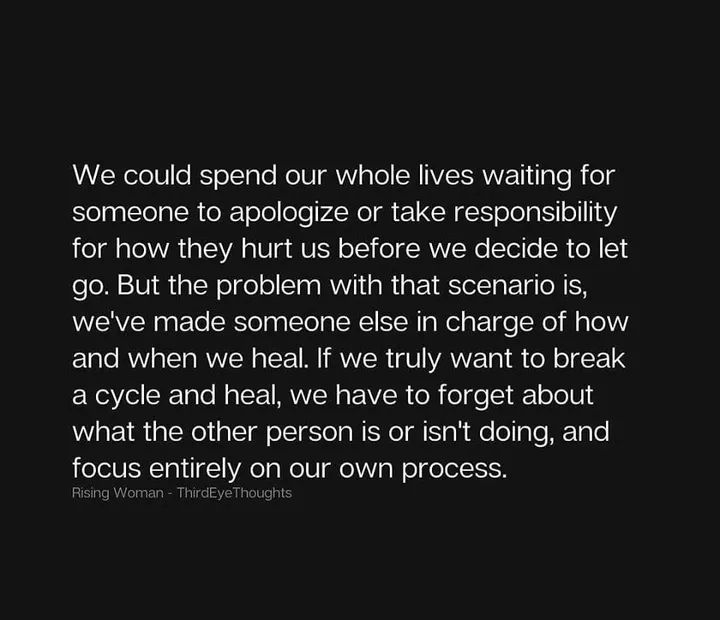 This is the epitome of selfishness. Not only does this say not to make any attempt at amends, but to put our own healing above the lesson to be learned. Dropping the subject--"letting go", as it were--means the transgressor is free to do the same thing to someone else, causing more harm. By making them see what they did, they can be stopped from causing more harm. This also comes up again. This is the epitome of selfishness. Not only does this say not to make any attempt at amends, but to put our own healing above the lesson to be learned. Dropping the subject--"letting go", as it were--means the transgressor is free to do the same thing to someone else, causing more harm. By making them see what they did, they can be stopped from causing more harm. This also comes up again.
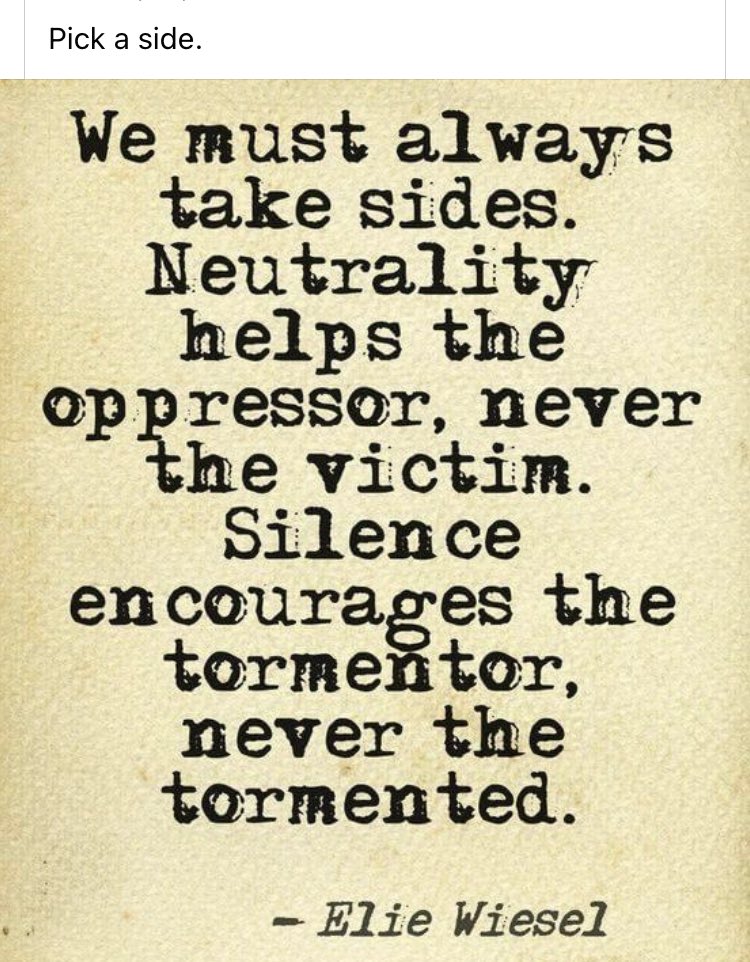 This is the "for us or against us" argument, which does nothing more than shame the undecided into rushing into a decision. In truth, some people stay neutral because the consequences of their involvement could be worse for the side they support. (This is a lesson thousands of Millennials and conservatives desperately need to learn.) This is the "for us or against us" argument, which does nothing more than shame the undecided into rushing into a decision. In truth, some people stay neutral because the consequences of their involvement could be worse for the side they support. (This is a lesson thousands of Millennials and conservatives desperately need to learn.)
 A sign to do what? Commit murder? Rob a bank? Start a cult? This one fails to make any indication of intent and can encourage someone to take a wrong action. A sign to do what? Commit murder? Rob a bank? Start a cult? This one fails to make any indication of intent and can encourage someone to take a wrong action.
 One critical thing people tend to ignore these days is that the "why" is always more important than the "what", especially when it comes to people's actions. This is because people have been reading false "why"s into things for decades in the form of jumping to conclusions. If someone is an asshole for the right reasons, continually being chastised or shunned for their actions can turn them into a real asshole--or worse. It's critical that we know why something is the case above all else. This meme completely misses this point. One critical thing people tend to ignore these days is that the "why" is always more important than the "what", especially when it comes to people's actions. This is because people have been reading false "why"s into things for decades in the form of jumping to conclusions. If someone is an asshole for the right reasons, continually being chastised or shunned for their actions can turn them into a real asshole--or worse. It's critical that we know why something is the case above all else. This meme completely misses this point.
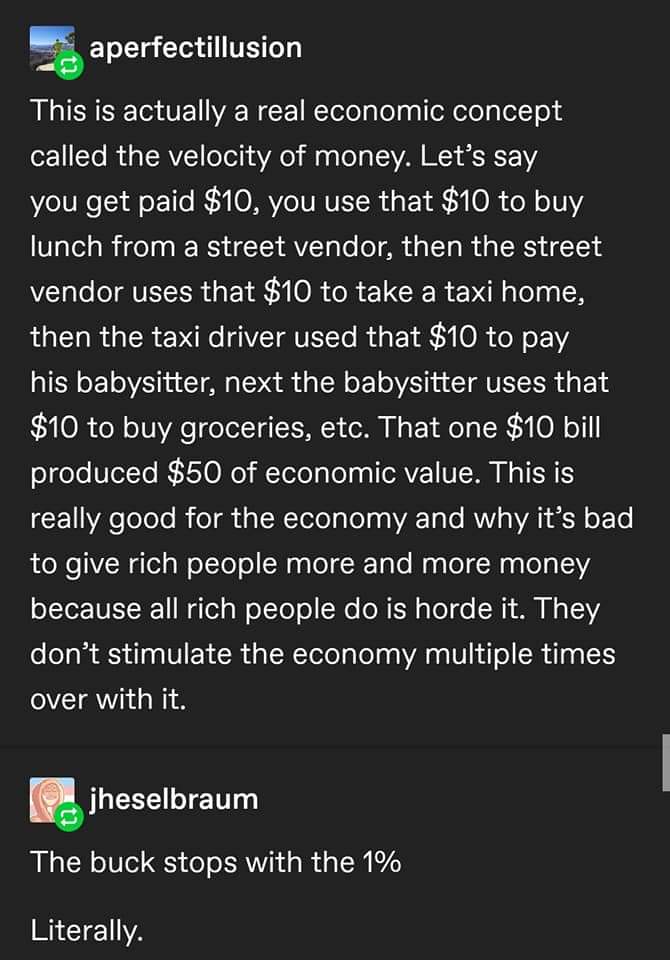 This meme is like the one above about waiting for a sign in that it fails to state the point--and in this case, gets owned for it, albeit unintentionally. After accurately describing the velocity of money, user aperfectillusion fails to state that spending is the strength of any economy and that the rich spend as little as possible, meaning something must be done to force the money into circulation. After failing to make his point, user jheselbruam shuts it all down with a simple statement of fact that could otherwise have been sidestepped. Now that the statement is made, any argument for the first statement must counter this fact, which cannot be done. The problem? aperfectillusion assumed he would be understood, and in doing so, opened the door for others to counter his statement. (In other places, I've addressed this as a key problem in Democratic messaging.) This meme is like the one above about waiting for a sign in that it fails to state the point--and in this case, gets owned for it, albeit unintentionally. After accurately describing the velocity of money, user aperfectillusion fails to state that spending is the strength of any economy and that the rich spend as little as possible, meaning something must be done to force the money into circulation. After failing to make his point, user jheselbruam shuts it all down with a simple statement of fact that could otherwise have been sidestepped. Now that the statement is made, any argument for the first statement must counter this fact, which cannot be done. The problem? aperfectillusion assumed he would be understood, and in doing so, opened the door for others to counter his statement. (In other places, I've addressed this as a key problem in Democratic messaging.)
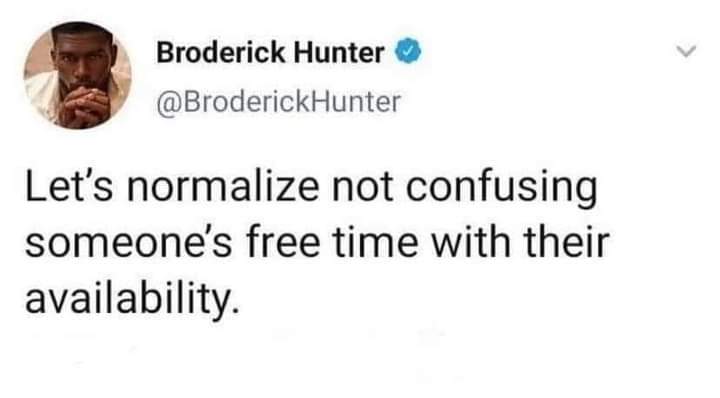 The clear intent of this is respect for the right of privacy. But what we are given is a vague generalization that doesn't always apply. Other reasons why it may be legitimate range from suspecting they're harming themselves to police serving a warrant. Legitimate reasons do not include showing up to take them to a party or an employer demanding they come in to work additional hours. The clear intent of this is respect for the right of privacy. But what we are given is a vague generalization that doesn't always apply. Other reasons why it may be legitimate range from suspecting they're harming themselves to police serving a warrant. Legitimate reasons do not include showing up to take them to a party or an employer demanding they come in to work additional hours.
 This is another generalization. There are also issues such as habits and just not knowing any better. This is another generalization. There are also issues such as habits and just not knowing any better.
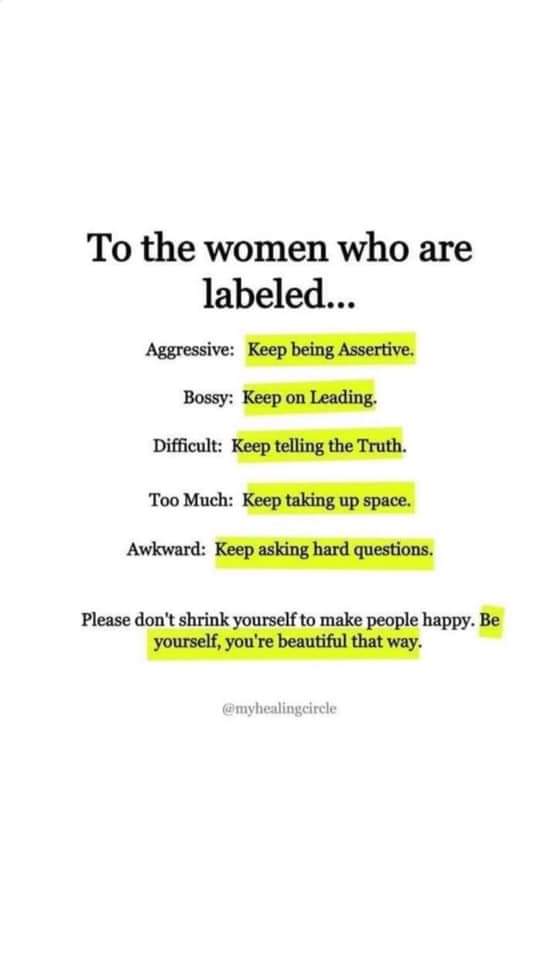 This emphasizes a problem I've talked about before. Each word has its own meaning, and no other word means exactly the same thing. The words used on the left side of this meme describe someone who has gone too far, often because of fear, lack of confidence, or control issues (these are among the more drastic reasons), while some on the right side are words that indicate a solid resolve without being threatening. This emphasizes a problem I've talked about before. Each word has its own meaning, and no other word means exactly the same thing. The words used on the left side of this meme describe someone who has gone too far, often because of fear, lack of confidence, or control issues (these are among the more drastic reasons), while some on the right side are words that indicate a solid resolve without being threatening.
Although the meme is about women, this list applies equally to everyone, as men can be worse than women in these respects.
- Assertion is a confident statement of either fact or demonstrable opinion in the presence of a contrary viewpoint. Aggression is a show of force; in this case, to gain unwiling assent.
- To lead is to use charisma, understanding, and reason to sway opinion to your side, while bossy refers to a manner of overt control.
- Someone who is difficult is one who gets in the way of the intent or purpose of things, usually through excessive questioning that is frequently based on personal opinions, while the truth is a simple statement of provable fact. Difficult people actually miss the facts on most occasions. In fairness, difficult people are sometimes right, and we should be open to it; however, we should always watch for inflated egos afterward.
- Too much is a term used when someone constantly interjects themselves into someone's affairs, which can be highly disruptive. Unlike the others, taking up space is similar in that it implies the time when the interjection is disruptive or discomforting.
- Awkward refers to someone with a lack of boundaries or persistent uncertainty. This is one source of asking hard questions, along with fear of the unknown, worry, and simple selfishness. Sometimes, they are impossible to answer because one question involves two different issues with two different answers, or combine valid and invalid questions. Although not truly childish, it is a frequent issue when dealing with children and can seem childish or stupid, depending on the line of questioning. Difficult people sometimes turn to asking hard questions.
Force versus confident statements. Asking endless questions when you should be listening to reason (which, to be fair, isn't always right). Being in someone's way all the time. This meme does nothing more than use conflated language to give women permission to force agreement with whatever they believe. (Again, this is something men can be worse at.)
 This meme demands that you blame yourself for anything someone does to you without your consent. It assumes nobody else was involved in creating the situation and that you were fully aware of everything. All too often, this is not the case. And if you don't know what's going on, there's no way to change the situation, except by sheer chance. In fact, this is akin to the "there are no victims" argument, which is only used by victimizers. (Think about the rapist who blames his victim.) This meme demands that you blame yourself for anything someone does to you without your consent. It assumes nobody else was involved in creating the situation and that you were fully aware of everything. All too often, this is not the case. And if you don't know what's going on, there's no way to change the situation, except by sheer chance. In fact, this is akin to the "there are no victims" argument, which is only used by victimizers. (Think about the rapist who blames his victim.)
 This meme says nothing more than to avoid taking responsibility for your own actions. You are responsible for any harm you cause, no matter how small. This meme says nothing more than to avoid taking responsibility for your own actions. You are responsible for any harm you cause, no matter how small.
All of these memes endorse selfishness in some way. But we have to look deeper. Although attitude and intent affect selfishness, the real determinant is the consequences. What effect do your actions, or lack thereof, have on the world? Does the person who wronged you learn better, or do they keep doing the same thing to others? And if they keep it up, what will come back around to you?
Selfishness is the bane of civilization. Unchecked, people are hurt. Endorsed, such as these memes do, society fractures.
Beliefs such as the ones presented in the memes above are a major reason American society is crumbling today.
Until next time . . .
|










 This meme screams at people to stop taking the blame for problems they create for others, which comes up again in this list. If someone has an internal struggle, it can cause problems, true. What those problems may be, however, is what our actions may hit upon--and possibly cause more problems for that person. And when that happens, yes, we are to blame.
This meme screams at people to stop taking the blame for problems they create for others, which comes up again in this list. If someone has an internal struggle, it can cause problems, true. What those problems may be, however, is what our actions may hit upon--and possibly cause more problems for that person. And when that happens, yes, we are to blame. This is the epitome of selfishness. Not only does this say not to make any attempt at amends, but to put our own healing above the lesson to be learned. Dropping the subject--"letting go", as it were--means the transgressor is free to do the same thing to someone else, causing more harm. By making them see what they did, they can be stopped from causing more harm. This also comes up again.
This is the epitome of selfishness. Not only does this say not to make any attempt at amends, but to put our own healing above the lesson to be learned. Dropping the subject--"letting go", as it were--means the transgressor is free to do the same thing to someone else, causing more harm. By making them see what they did, they can be stopped from causing more harm. This also comes up again. This is the "for us or against us" argument, which does nothing more than shame the undecided into rushing into a decision. In truth, some people stay neutral because the consequences of their involvement could be worse for the side they support. (This is a lesson thousands of Millennials and conservatives desperately need to learn.)
This is the "for us or against us" argument, which does nothing more than shame the undecided into rushing into a decision. In truth, some people stay neutral because the consequences of their involvement could be worse for the side they support. (This is a lesson thousands of Millennials and conservatives desperately need to learn.) A sign to do what? Commit murder? Rob a bank? Start a cult? This one fails to make any indication of intent and can encourage someone to take a wrong action.
A sign to do what? Commit murder? Rob a bank? Start a cult? This one fails to make any indication of intent and can encourage someone to take a wrong action. One critical thing people tend to ignore these days is that the "why" is always more important than the "what", especially when it comes to people's actions. This is because people have been reading false "why"s into things for decades in the form of jumping to conclusions. If someone is an asshole for the right reasons, continually being chastised or shunned for their actions can turn them into a real asshole--or worse. It's critical that we know why something is the case above all else. This meme completely misses this point.
One critical thing people tend to ignore these days is that the "why" is always more important than the "what", especially when it comes to people's actions. This is because people have been reading false "why"s into things for decades in the form of jumping to conclusions. If someone is an asshole for the right reasons, continually being chastised or shunned for their actions can turn them into a real asshole--or worse. It's critical that we know why something is the case above all else. This meme completely misses this point. This meme is like the one above about waiting for a sign in that it fails to state the point--and in this case, gets owned for it, albeit unintentionally. After accurately describing the velocity of money, user aperfectillusion fails to state that spending is the strength of any economy and that the rich spend as little as possible, meaning something must be done to force the money into circulation. After failing to make his point, user jheselbruam shuts it all down with a simple statement of fact that could otherwise have been sidestepped. Now that the statement is made, any argument for the first statement must counter this fact, which cannot be done. The problem? aperfectillusion assumed he would be understood, and in doing so, opened the door for others to counter his statement. (In other places, I've addressed this as a key problem in Democratic messaging.)
This meme is like the one above about waiting for a sign in that it fails to state the point--and in this case, gets owned for it, albeit unintentionally. After accurately describing the velocity of money, user aperfectillusion fails to state that spending is the strength of any economy and that the rich spend as little as possible, meaning something must be done to force the money into circulation. After failing to make his point, user jheselbruam shuts it all down with a simple statement of fact that could otherwise have been sidestepped. Now that the statement is made, any argument for the first statement must counter this fact, which cannot be done. The problem? aperfectillusion assumed he would be understood, and in doing so, opened the door for others to counter his statement. (In other places, I've addressed this as a key problem in Democratic messaging.) The clear intent of this is respect for the right of privacy. But what we are given is a vague generalization that doesn't always apply. Other reasons why it may be legitimate range from suspecting they're harming themselves to police serving a warrant. Legitimate reasons do not include showing up to take them to a party or an employer demanding they come in to work additional hours.
The clear intent of this is respect for the right of privacy. But what we are given is a vague generalization that doesn't always apply. Other reasons why it may be legitimate range from suspecting they're harming themselves to police serving a warrant. Legitimate reasons do not include showing up to take them to a party or an employer demanding they come in to work additional hours. This is another generalization. There are also issues such as habits and just not knowing any better.
This is another generalization. There are also issues such as habits and just not knowing any better. This emphasizes a problem I've
This emphasizes a problem I've  This meme demands that you blame yourself for anything someone does to you without your consent. It assumes nobody else was involved in creating the situation and that you were fully aware of everything. All too often, this is not the case. And if you don't know what's going on, there's no way to change the situation, except by sheer chance. In fact, this is akin to the "there are no victims" argument, which is only used by victimizers. (Think about the rapist who blames his victim.)
This meme demands that you blame yourself for anything someone does to you without your consent. It assumes nobody else was involved in creating the situation and that you were fully aware of everything. All too often, this is not the case. And if you don't know what's going on, there's no way to change the situation, except by sheer chance. In fact, this is akin to the "there are no victims" argument, which is only used by victimizers. (Think about the rapist who blames his victim.) This meme says nothing more than to avoid taking responsibility for your own actions. You are responsible for any harm you cause, no matter how small.
This meme says nothing more than to avoid taking responsibility for your own actions. You are responsible for any harm you cause, no matter how small.